I'm excited to share a new growth framework that @danhockenmaier and I have been developing (with help from the amazing @reforge crew)
I've been finding myself coming back to this framework often when talking to founders about growth.
Thread
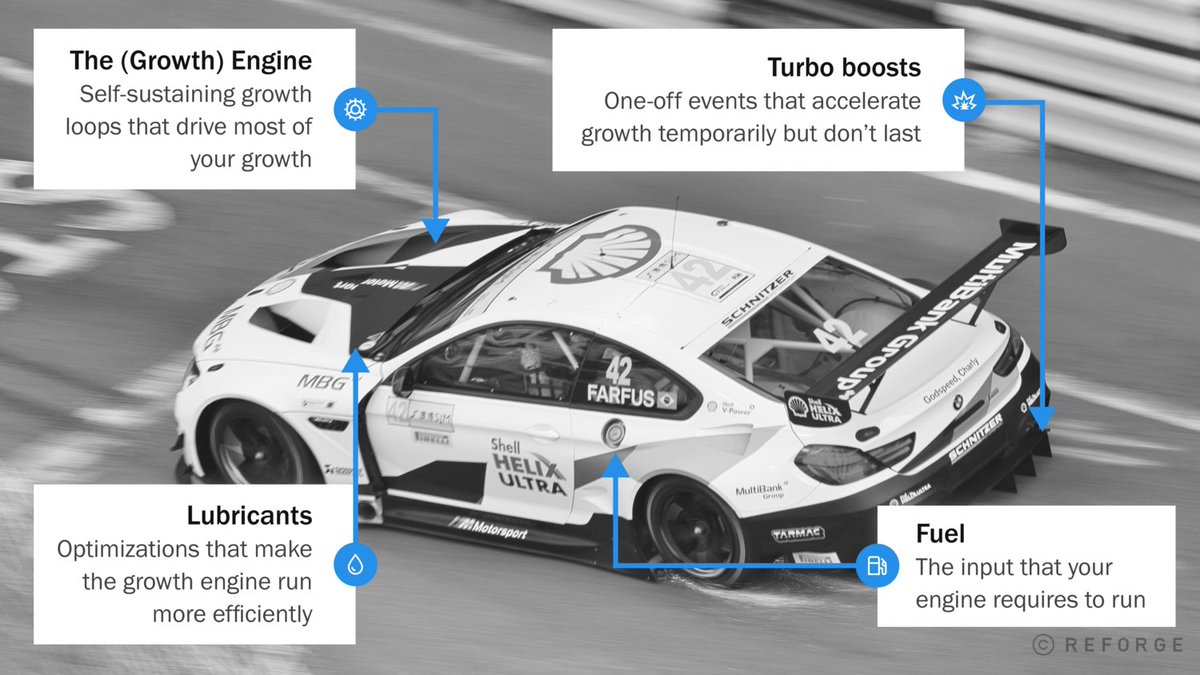
2. 💥 Turbo boosts: One-off events that accelerate growth temporarily but don’t last (e.g. PR, events, Super Bowl ads)
4. ⛽ Fuel: The input that your engine requires to run (e.g. capital, content, users).
Companies grow primarily through four possible Growth Engines:
• Performance marketing: FB, AdWords, TV, etc.
• Virality: Word-of-mouth, referrals, inviting friends, etc.
• Content: SEO, shareable videos, or newsletters, etc.
• Sales: Salespeople
• Uber/Lyft: Virality + Performance marketing
• Snapchat: Virality
• Zoom: Virality + Sales
• Slack: Virality + Sales
• Salesforce: Sales
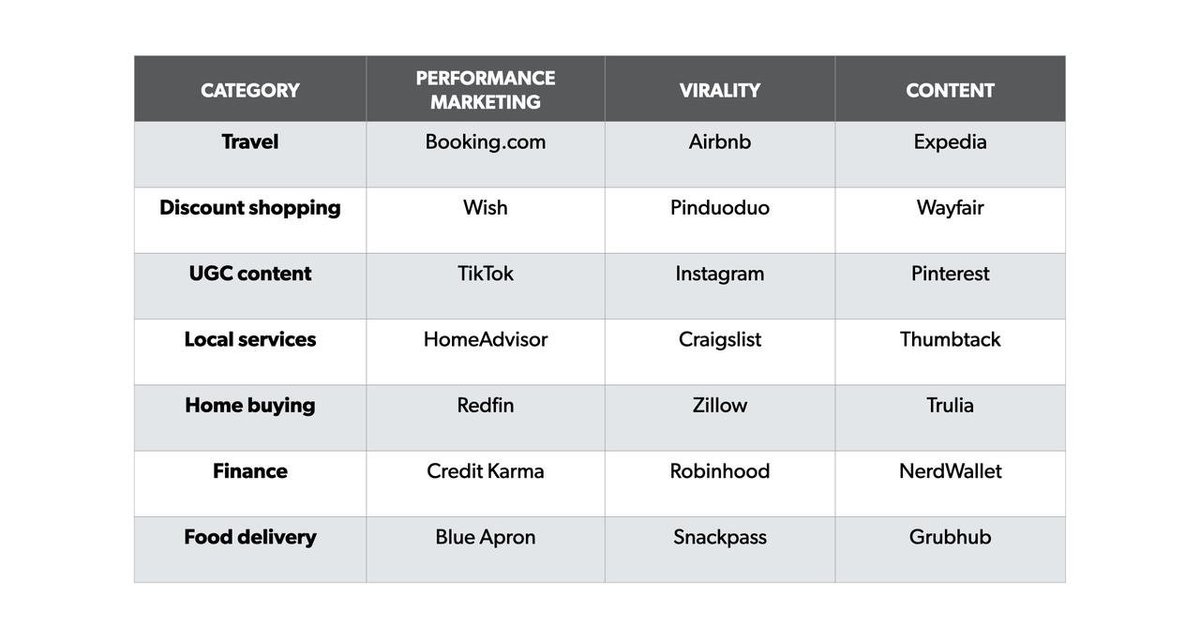
https://t.co/djWwLzhqOk
Next, we have Turbo Boosts. Similar to a turbocharger in a car, these are tactics that can accelerate growth for a period of time but don’t deliver ongoing acceleration. They include things like:
• PR
• Events
• Brand marketing campaigns
Third, we have lubricants. Lubricants don’t drive growth directly, but instead optimize the efficiency of your engine. Also, without enough lubrication, your engine will stop. There are 3 broad categories of lubricants:
• Conversion
• Activation
• Retention
https://t.co/MlrmElVjF0
Finally, we have Fuel. Without it, even the most optimized engine won’t run. The type of fuel required is specific to the type of growth engine you’re running:
• Paid marketing and sales engines primarily need capital, which can be invested in ads or salespeople
• Content engines unsurprisingly need more content, which can be used to attract users.
• Viral engines require only more users, who in turn refer additional users.
Huge shout-out to @bbalfour and @onecaseman for their help with this post, and to my brother-from-another-mother @danhockenmaier
https://t.co/ZGW1qWT5zC
More from Lenny Rachitsky
Earlier today, I gave a talk at the @SubstackInc's writer conference about building a writing habit. Below are the ten concrete strategies I shared that have helped me publish a post every week for 1.5 years 👇
0/ First of all, just sharing advice about this topic gives me serious impostor syndrome because writing is still pretty new to me, and I have much to learn. But these are things that have helped me, and I hope they'll help you.
1/ Strategy 1: Commit publicly
This was maybe 50% of my initial motivation. Having told people I was going to write weekly made me feel bad when even thinking about skipping a week. It gave me just enough nudge to keep
1b/ You don't need to make this super public. Just sending an email to a few friends regularly with your concrete goals about writing (and anything else) works wonders.
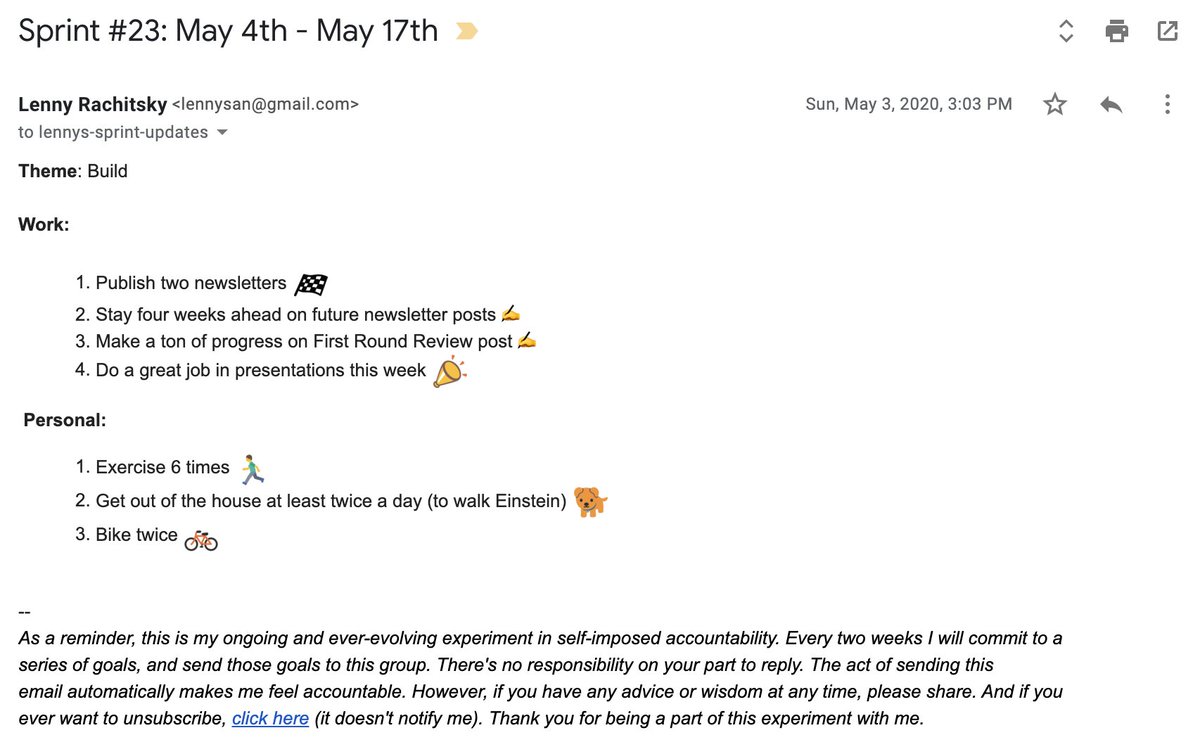
1c/ If you *really* want to be motivated, ask people for money. Nothing motivates you more than people paying you for regular
0/ First of all, just sharing advice about this topic gives me serious impostor syndrome because writing is still pretty new to me, and I have much to learn. But these are things that have helped me, and I hope they'll help you.
1/ Strategy 1: Commit publicly
This was maybe 50% of my initial motivation. Having told people I was going to write weekly made me feel bad when even thinking about skipping a week. It gave me just enough nudge to keep
I'm kicking off an experiment. Inspired by the great @joulee, and building off of the great inbound questions I continue to get from ya'll -- I\u2019m going to start using my newsletter to answer your questions. \U0001f44b
— Lenny Rachitsky (@lennysan) September 12, 2019
Sign up belowhttps://t.co/z1F1efMcue
1b/ You don't need to make this super public. Just sending an email to a few friends regularly with your concrete goals about writing (and anything else) works wonders.

1c/ If you *really* want to be motivated, ask people for money. Nothing motivates you more than people paying you for regular
Life alert: I\u2019m adding a paid plan to my newsletter \U0001f91e
— Lenny Rachitsky (@lennysan) April 7, 2020
After much prodding from readers and friends, I\u2019m going to take the leap and give this life-path a shot.
Consider subscribing and joining me on this journey \U0001f64fhttps://t.co/gtFm4POGSQ
The most sophisticated growth team no one talks about: @WishShopping
1. The #1 shopping app in 40+ countries
2. Rumored to often be the #1 spender on FB and Google
3. 2 million items sold daily
I sat down with @cplimon to learn about the notoriously secretive company. Read on 👇
1/ Your brand constraint is Wish's opportunity
Wish's superpower is leaving no room for taste or opinion. It's what happens when a machine builds a company based on data. The founder didn't plan to sell cheap goods to low-socioeconomic customers, but where the data took him.
"Until you work at a place like Wish, you don't know what data-driven is. Everyone else is data-driven when it's convenient, when it agrees with your opinions. Wish is great at ignoring their own emotions. It's data-driven with as much intellectual honesty as possible."
For example
2/ Differentiate by serving the under-served
Most of Wish’s initial sales came from places like Florida, greater LA county, and middle-America. Specifically, zip codes with 95% Spanish speakers. Later, Africa, Latin America and Eastern Europe (avg household income $18,000/year)
1. The #1 shopping app in 40+ countries
2. Rumored to often be the #1 spender on FB and Google
3. 2 million items sold daily
I sat down with @cplimon to learn about the notoriously secretive company. Read on 👇
1/ Your brand constraint is Wish's opportunity
Wish's superpower is leaving no room for taste or opinion. It's what happens when a machine builds a company based on data. The founder didn't plan to sell cheap goods to low-socioeconomic customers, but where the data took him.
"Until you work at a place like Wish, you don't know what data-driven is. Everyone else is data-driven when it's convenient, when it agrees with your opinions. Wish is great at ignoring their own emotions. It's data-driven with as much intellectual honesty as possible."
For example
cursed wish ads pic.twitter.com/eMlx4LqgKA
— big meaty claws (@leisurepIex) June 4, 2019
2/ Differentiate by serving the under-served
Most of Wish’s initial sales came from places like Florida, greater LA county, and middle-America. Specifically, zip codes with 95% Spanish speakers. Later, Africa, Latin America and Eastern Europe (avg household income $18,000/year)
Matt Mochary has been CEO coach to @naval, the founders of OpenAI, Notion, Rippling, Robinhood, Coinbase, Reddit, Plaid, Flexport, Opendoor, partners at Sequoia, YC, Benchmark, and many others.
He also open-sourced his entire curriculum, templates and all. Here's a link 👇
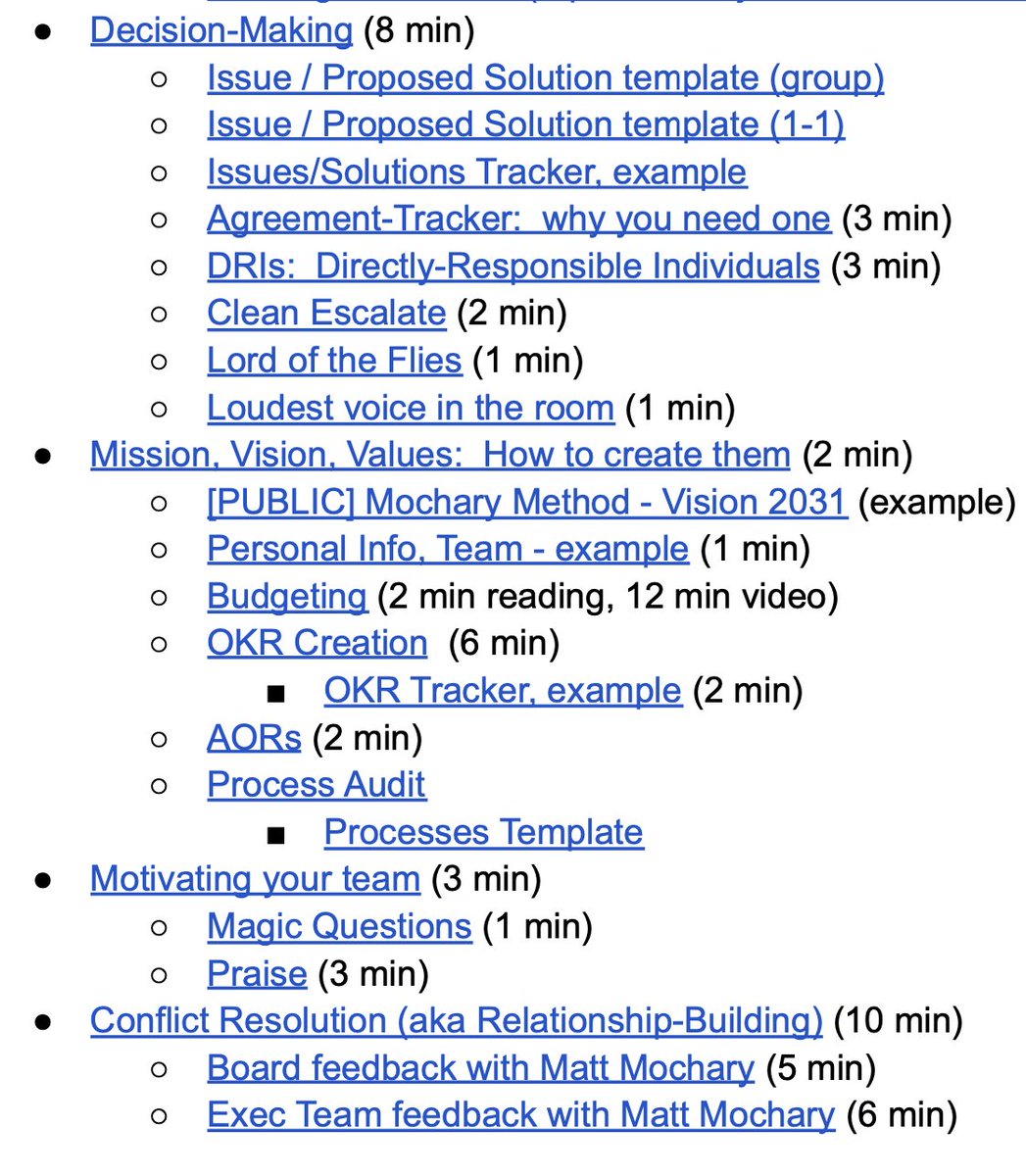
The Mochary Method Curriculum ➔ https://t.co/A8J51IzYhz
My recent conversation with @mattmochary where we talk about fear, anger, innovation, how to lay people off well, and his coaching practice ➔
Also in podcast form ➔
For more from Matt, buy this book
He also open-sourced his entire curriculum, templates and all. Here's a link 👇

The Mochary Method Curriculum ➔ https://t.co/A8J51IzYhz
My recent conversation with @mattmochary where we talk about fear, anger, innovation, how to lay people off well, and his coaching practice ➔
Also in podcast form ➔
For more from Matt, buy this book
More from Tech
Next.js has taken the web dev world by storm
It’s the @reactjs framework devs rave about praising its power, flexibility, and dev experience
Don't feel like you're missing out!
Here's everything you need to know in 10 tweets
Let’s dive in 🧵
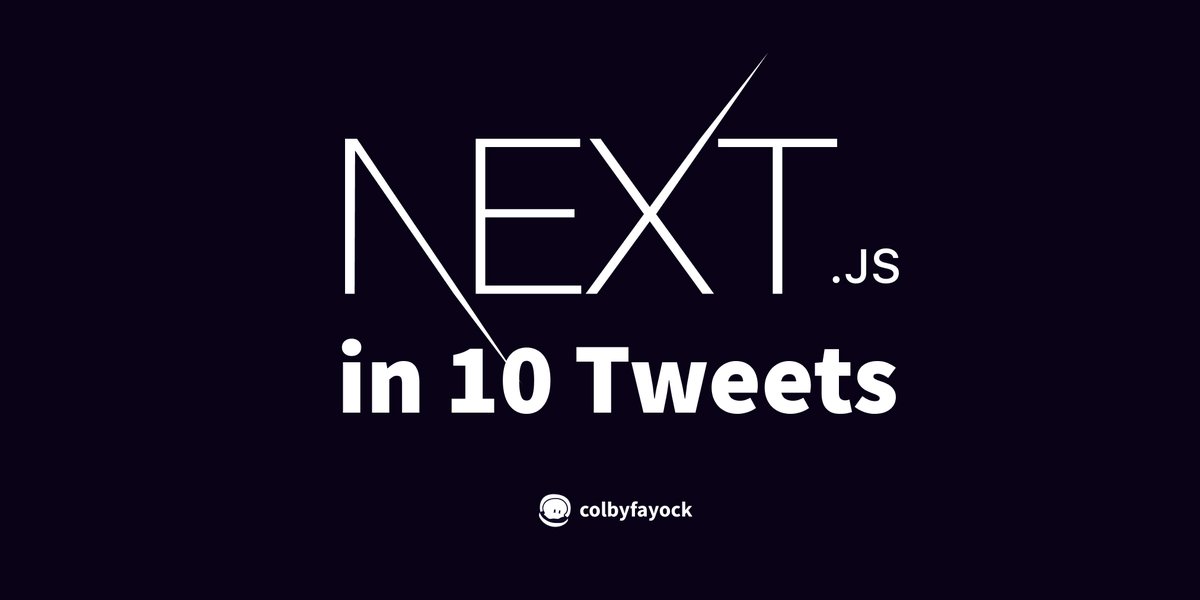
Next.js is a @reactjs framework from @vercel
It couples a great dev experience with an opinionated feature set to make it easy to spin up new performant, dynamic web apps
It's used by many high-profile teams like @hulu, @apple, @Nike, & more
https://t.co/whCdm5ytuk
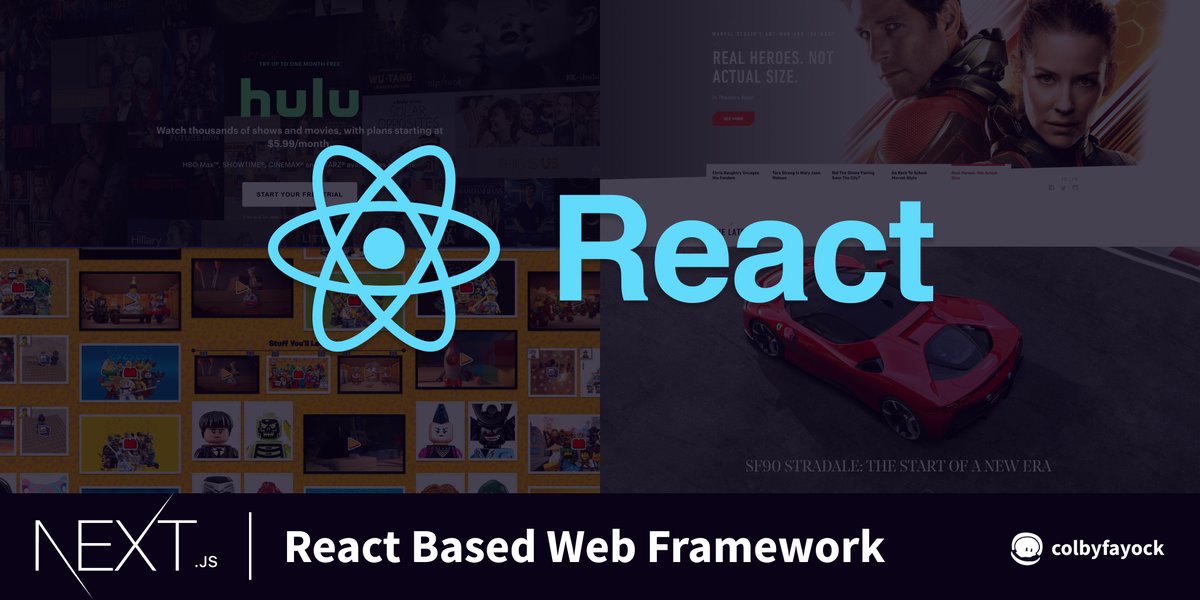
@vercel @hulu @Apple @Nike The team at @vercel, formerly Zeit, originally and launched v1 of the framework on Oct 26, 2016 in the pursuit of universal JavaScript apps
Since then, the team & community has grown expotentially, including contributions from giants like @Google
https://t.co/xPPTOtHoKW
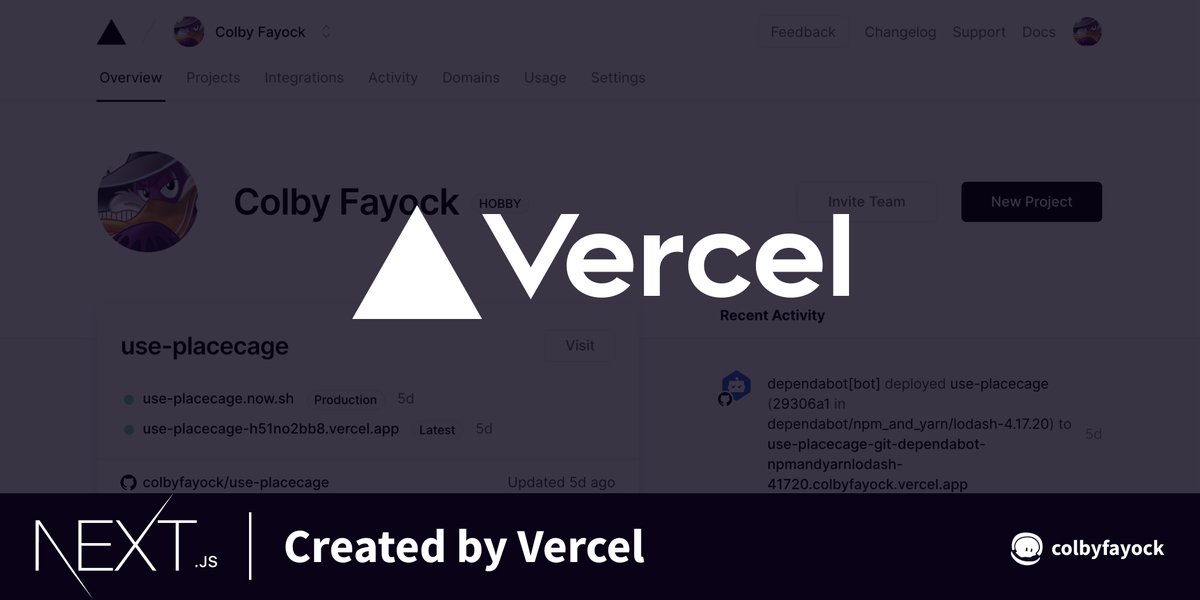
@vercel @hulu @Apple @Nike @Google In the #jamstack world, Next.js pulled a hefty 58.6% share of framework adoption in 2020
Compared to other popular @reactjs frameworks like Gatsby, which pulled in 12%
*The Next.js stats likely include some SSR, arguably not Jamstack
https://t.co/acNawfcM4z
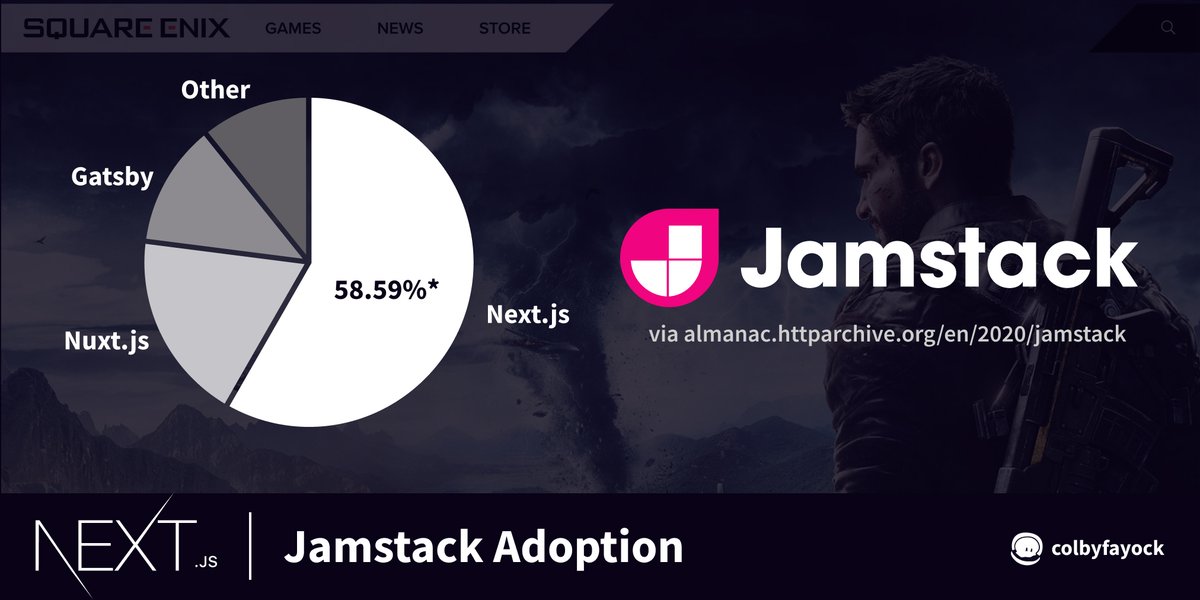
@vercel @hulu @Apple @Nike @Google The easiest way to get started with a new Next.js app is with Create Next App
Simply run:
yarn create next-app
or
npx create-next-app
You can even start from a git-based template with the -e flag
yarn create next-app -e https://t.co/JMQ87gi1ue
https://t.co/rwKhp7zlys
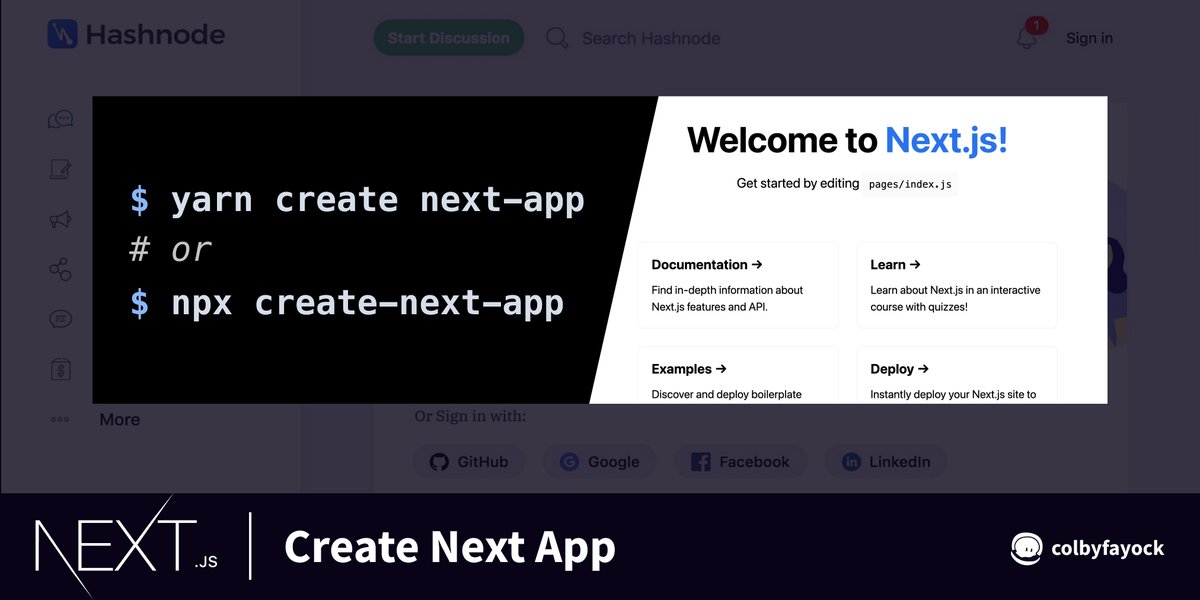
It’s the @reactjs framework devs rave about praising its power, flexibility, and dev experience
Don't feel like you're missing out!
Here's everything you need to know in 10 tweets
Let’s dive in 🧵

Next.js is a @reactjs framework from @vercel
It couples a great dev experience with an opinionated feature set to make it easy to spin up new performant, dynamic web apps
It's used by many high-profile teams like @hulu, @apple, @Nike, & more
https://t.co/whCdm5ytuk

@vercel @hulu @Apple @Nike The team at @vercel, formerly Zeit, originally and launched v1 of the framework on Oct 26, 2016 in the pursuit of universal JavaScript apps
Since then, the team & community has grown expotentially, including contributions from giants like @Google
https://t.co/xPPTOtHoKW

@vercel @hulu @Apple @Nike @Google In the #jamstack world, Next.js pulled a hefty 58.6% share of framework adoption in 2020
Compared to other popular @reactjs frameworks like Gatsby, which pulled in 12%
*The Next.js stats likely include some SSR, arguably not Jamstack
https://t.co/acNawfcM4z

@vercel @hulu @Apple @Nike @Google The easiest way to get started with a new Next.js app is with Create Next App
Simply run:
yarn create next-app
or
npx create-next-app
You can even start from a git-based template with the -e flag
yarn create next-app -e https://t.co/JMQ87gi1ue
https://t.co/rwKhp7zlys




























